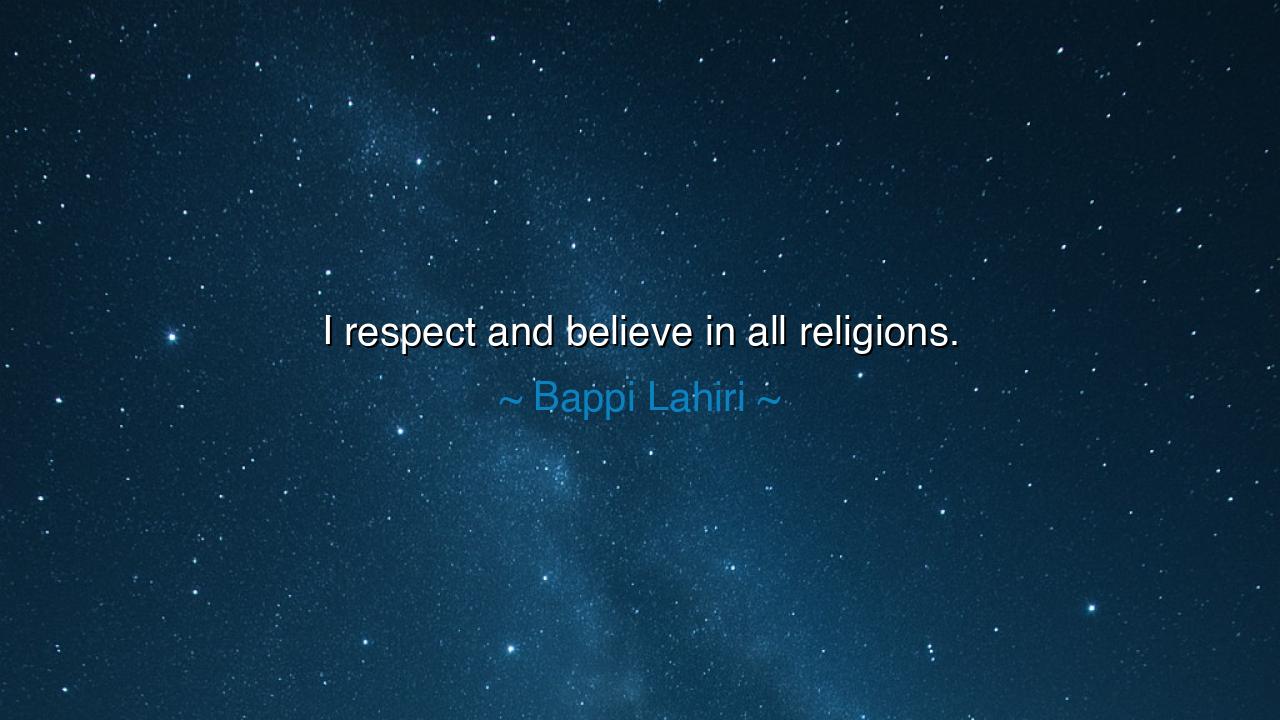
I respect and believe in all religions.






Hear, O seekers of harmony, the words of Bappi Lahiri, who proclaimed with simplicity and depth: “I respect and believe in all religions.” Though brief, this statement shines with the brilliance of wisdom gathered from centuries past. It is not the boast of one man, but the echo of an eternal truth: that the divine is too vast to be confined to a single path, and that the sacred takes many forms, yet all rivers flow into the same boundless sea.
The origin of these words lies in the heart of a man who, though famed for music and adorned in gold, understood the greater treasure of life: respect. To believe in all religions is not to be tossed about by every creed, but to recognize the common light within them. Lahiri’s declaration reflects an ancient teaching, found in the Vedas, in the sayings of Christ, in the wisdom of the Prophet, and in the chants of the Buddha: that love and reverence for one another stand above division, and that the sacred flame shines in every temple, mosque, and church alike.
This principle has been lived out by noble souls across history. Recall the mighty Emperor Ashoka, who, after the bloody conquest of Kalinga, turned away from cruelty and declared that all faiths must be honored. He inscribed upon stone pillars his decree: that one should praise not only one’s own tradition but also listen to and respect the traditions of others. His reign became a symbol of tolerance, where many religions flourished side by side. Like Lahiri’s words, Ashoka’s example reminds us that peace among peoples is born of reverence, not rivalry.
So too did Akbar the Great, ruler of the Mughal Empire, seek unity through respect. He invited scholars of Hinduism, Islam, Christianity, and other creeds to his court, not to debate in scorn but to learn in humility. His heart sought to weave a tapestry from many threads, a vision that mirrored Lahiri’s: that true belief honors the truth wherever it is found. Such rulers are remembered not merely for their power, but for their wisdom in seeing humanity as one family under many names for the divine.
The emotional strength of Lahiri’s words lies in their gentleness, for they strike against the arrogance of exclusivity. How often have men waged war in the name of the sacred, each proclaiming his own truth supreme! Yet Lahiri reminds us: it is not supremacy but respect that ennobles faith. When one believes that every faith carries light, one opens the door to friendship, compassion, and understanding. This is not weakness but strength, for it requires the humility to see the divine in unfamiliar forms.
The lesson for us is clear: to live well, we must honor the beliefs of others as we honor our own. This does not mean abandoning one’s path, but walking it with humility, while recognizing that others too walk with sincerity. If you are Christian, respect the chant of the Hindu. If you are Muslim, honor the silence of the Buddhist. If you are atheist, acknowledge the devotion of the believer. By doing so, you cultivate peace in your own soul and in the world around you.
Therefore, let your actions reflect this wisdom. When you meet another whose belief differs, do not mock but listen. When you see a festival, do not scorn but rejoice in its joy. Teach your children that truth wears many garments, but its essence is one. Support communities of different faiths in your neighborhood, and build bridges rather than walls.
And finally, remember the eternal teaching hidden in Lahiri’s simple confession: “I respect and believe in all religions.” For the divine, like music, cannot be confined to one note alone. It is a symphony of many voices, each carrying a part of the eternal melody. To honor them all is to draw closer to the great harmony that binds the world together.






AAdministratorAdministrator
Welcome, honored guests. Please leave a comment, we will respond soon